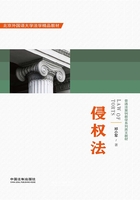
Chapter Ⅴ UNFORESEEABLE CONSEQUENCES
Unexpected Result
In proving negligence,one important aspect to state the duty of care,a standard according to which an ordinary and reasonably prudent person would or would not conduct himself under the circumstance,and the breach of that duty,we say,is a negligent wrong for which liability will entail if it somehow causes the injury of another person.That duty,however,necessarily involves foreseeability,because if there is nothing to care for,no one to be injured,why would anyone be careful.For example,if one is driving on a highway that is empty and straight,without anticipation of a pedestrian walking on it,why would he rest his foot on the brake,ready to stop at any moment? He wouldn’t because he does not expect to see any obstacle in front of him.He would simply keep driving on.
But human errors are inevitable,and accidents do take place,even if you rest your foot on the brake all the time (as you might cause trouble behind you).So,does it matter when you (or a reasonably prudent person) fail to see what is going to happen,and if so,to what extent?